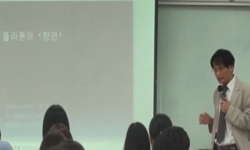이 글은 알랭 드 보통의 연애론을 헤겔의 사고 발전론의 관점에서 재구성하는 것이다. 드 보통은 『사랑의 에세이』와 『낭만적 운동』이라는 현상학적 연애 소설을 썼다. 헤겔은 『정신 현...
http://chineseinput.net/에서 pinyin(병음)방식으로 중국어를 변환할 수 있습니다.
변환된 중국어를 복사하여 사용하시면 됩니다.
- 中文 을 입력하시려면 zhongwen을 입력하시고 space를누르시면됩니다.
- 北京 을 입력하시려면 beijing을 입력하시고 space를 누르시면 됩니다.
https://www.riss.kr/link?id=A76355892
- 저자
- 발행기관
- 학술지명
- 권호사항
-
발행연도
2009
-
작성언어
Korean
-
주제어
알랭 드 보통'헤겔 ; 사랑 ; 자기 정립 ; 자기 의식 ; Alain de Botton ; Hegel ; love ; self-positing ; self-consciousness
-
등재정보
KCI등재후보
-
자료형태
학술저널
- 발행기관 URL
-
수록면
63-90(28쪽)
-
KCI 피인용횟수
3
- 제공처
-
0
상세조회 -
0
다운로드
부가정보
국문 초록 (Abstract)
이 글은 알랭 드 보통의 연애론을 헤겔의 사고 발전론의 관점에서 재구성하는 것이다. 드 보통은 『사랑의 에세이』와 『낭만적 운동』이라는 현상학적 연애 소설을 썼다. 헤겔은 『정신 현상학』에서 인간 사고의 발전을 여러 단계로 나누어 기술한다. 나는 그 책에서 ‘의식에서 자기의식’으로 나아가는 전환을 드 보통의 소설에 적용할 것이다. 드 보통의 소설에서 주인공들은 사랑의 두 단계를 경험한다. 첫째 단계는 ’자연적 태도의 사랑’이며, 두 번째 단계는 ’자기 정립적 태도의 사랑'이다. 연애는 자연적 태도의 사랑에서 자기 정립적 태도의 사랑으로 움직인다. 자연적 태도의 사랑은 헤겔의 관점에서 보자면 의식 단계에 머물고 있다 자기 정립적 태도의 사랑은 『정신 현상학』에서 자기 의식 단계에 해당한다. 드 보통은 사랑의 발전에서 자기 정립 단계 이상을 제시하지 않았다.
다국어 초록 (Multilingual Abstract)
The love of the natural attitude is object-centric love where the subject loves an object because the object has certain properties. Here the love-dominating element is the object's properties. So that love would be called property-based love. The natural attitude’s love can be compared with the consciousness in the Phenomenology, which believes the absolute division between the subject and the object.
The love of the self-positing attitude is subject-centric love where the subject loves an object because the subject loves the subject’s loving the object. That love is not property-based love because the object’s propertIes are not the love-dominating element. The self-positing attitude’s love can be compared with the self-consciousness in the Phenomenology, which believes that the relation of the subject to the object is grounded in self-relation.
The love of the self-positing attitude is an egoistic love because the motives of the love is the pursuit of self-certainty. Although there are sacrifice and regard for the object in that love, it has its own limit. The subject’s self-sacrificing devotion to the object would last as long as the projection of being on the subject's part can match the subject’s loving the object. The mutual recognition in the self-positing attitude is time-bounded.
The love of the spiritual attitude is beyond the love of the self-posting attitude, overcoming the limits of that love. Alain de Botton does not deal with the spiritual attitude's love. Could the constant mutual recognition in love be possible if the subject and the object establish universally binding institutions the the spirit in the Phenomenology? The question would be my next project.
This essay is to reconstruct Alain de Botton's theory of love through Hegel’s philosophy. De Botton describes the movement of love in his novels, Essays in love and Romantic Movement, and Hegel does that of knowing in Phenenomenology of Spirit. In t...
This essay is to reconstruct Alain de Botton's theory of love through Hegel’s philosophy. De Botton describes the movement of love in his novels, Essays in love and Romantic Movement, and Hegel does that of knowing in Phenenomenology of Spirit. In the light of the development of consciousness to self-consciousness in the Phenomenology, I find two stages of love in de Botton’s novels. The one is love of the natural attitude, and the other is love of the self-positing attitude.
The love of the natural attitude is object-centric love where the subject loves an object because the object has certain properties. Here the love-dominating element is the object's properties. So that love would be called property-based love. The natural attitude’s love can be compared with the consciousness in the Phenomenology, which believes the absolute division between the subject and the object.
The love of the self-positing attitude is subject-centric love where the subject loves an object because the subject loves the subject’s loving the object. That love is not property-based love because the object’s propertIes are not the love-dominating element. The self-positing attitude’s love can be compared with the self-consciousness in the Phenomenology, which believes that the relation of the subject to the object is grounded in self-relation.
The love of the self-positing attitude is an egoistic love because the motives of the love is the pursuit of self-certainty. Although there are sacrifice and regard for the object in that love, it has its own limit. The subject’s self-sacrificing devotion to the object would last as long as the projection of being on the subject's part can match the subject’s loving the object. The mutual recognition in the self-positing attitude is time-bounded.
The love of the spiritual attitude is beyond the love of the self-posting attitude, overcoming the limits of that love. Alain de Botton does not deal with the spiritual attitude's love. Could the constant mutual recognition in love be possible if the subject and the object establish universally binding institutions the the spirit in the Phenomenology? The question would be my next project.
목차 (Table of Contents)
- 1. 서론
- 2. 알랭드 보통의 연애론
- 3. 결론
- 참고문헌
- 〈Abstract〉
- 1. 서론
- 2. 알랭드 보통의 연애론
- 3. 결론
- 참고문헌
- 〈Abstract〉
참고문헌 (Reference)
1 Pippin, Robert B., "You Can’t Get There from Here: Transition problems in Hegel’s Phenomenology of Spirit in : The Cambridge Companion to Hegel" The Cambridge University Press 52-85, 1993
2 Wood. Allen, "W. Kant" Blackwell Publishing 2005
3 Singer, Irving, "The nature of Love. 1. Plato to Luther" The University of Chicago Press 1966
4 Soble, Alan, "The Structure of Love" Yale University Press 1990
5 De Botton, Alain, "The Consolations of Philosophy(젊은 베르테르의 기쁨)" 생각의 나무 2001
6 De Botton, Alain, "Romantic Movement: Sex, Shopping and the Novel(우리는 사랑일까)" 은행나무 2008
7 Plato. Republic, "Plato: Complete Works" Hackett Publishing Company 1997
8 Plato. Symposium, "Plato: Complete Works" Hackett Publishing Company 1997
9 Hegel, G. W. F., "Phönomenology des Geistes. GA. Band 9" Felix Meiner Verlag Hamburg
10 Baker, Robert, "Introduction in : Philosophy & Sex" Prometheus Books 1975
1 Pippin, Robert B., "You Can’t Get There from Here: Transition problems in Hegel’s Phenomenology of Spirit in : The Cambridge Companion to Hegel" The Cambridge University Press 52-85, 1993
2 Wood. Allen, "W. Kant" Blackwell Publishing 2005
3 Singer, Irving, "The nature of Love. 1. Plato to Luther" The University of Chicago Press 1966
4 Soble, Alan, "The Structure of Love" Yale University Press 1990
5 De Botton, Alain, "The Consolations of Philosophy(젊은 베르테르의 기쁨)" 생각의 나무 2001
6 De Botton, Alain, "Romantic Movement: Sex, Shopping and the Novel(우리는 사랑일까)" 은행나무 2008
7 Plato. Republic, "Plato: Complete Works" Hackett Publishing Company 1997
8 Plato. Symposium, "Plato: Complete Works" Hackett Publishing Company 1997
9 Hegel, G. W. F., "Phönomenology des Geistes. GA. Band 9" Felix Meiner Verlag Hamburg
10 Baker, Robert, "Introduction in : Philosophy & Sex" Prometheus Books 1975
11 Dove. Kenley R., "Hegel's Phenomenological Method in : The Phenomenology of Spirit Reader: Critical and Interpretative Essays" State University of New York Press 52-75, 1998
12 Sallis, John, "Hegel's Concept of Presentation: Its Determination in the Preface to the Phenomenology of Spirit in : The Phenomenology of Spirit Reader: Critical and Interpretative Essays" State University of New York Press 25-51, 1998
13 Verene, Donald Phillip, "Hegel's Absolute: An Introduction to Reading the Phenomenology of Spirit" State University of New York Press 2007
14 De Botton, Alain, "Essays in Love(왜 나는 너를 사랑하는가)" 도서출판 청미래 2008
15 Aristotle, "Aristotle's Nicomachean Ethics" Institute of Global Cultural Studies. Bingham University 1999
16 Houlgate, Stephen, "An Introduction to Hegel: Freedom, Truth and History" Blackwell Publishing 2005
동일학술지(권/호) 다른 논문
-
영어 동사의 단순현재시제와 진행상의 인지적 학습에 관한 연구
- 경성대학교 인문과학연구소
- 오주영(Oh Ju-Young)
- 2009
- KCI등재후보
-
소설과 영화 비교 연구 - 존 파울즈의 『프랑스 중위 의 여자』의 경우
- 경성대학교 인문과학연구소
- 나병우(Na Byung-Woo)
- 2009
- KCI등재후보
-
- 경성대학교 인문과학연구소
- 손호은(Son Ho-Eun)
- 2009
- KCI등재후보
-
유치원과 초등학교 1학년 정보통신윤리 교사용 지도서의 비교를 위한 기초 연구
- 경성대학교 인문과학연구소
- 오경숙(Oh Kyung-Sook)
- 2009
- KCI등재후보
분석정보
인용정보 인용지수 설명보기
학술지 이력
| 연월일 | 이력구분 | 이력상세 | 등재구분 |
|---|---|---|---|
| 2018 | 평가예정 | 신규평가 신청대상 (신규평가) | |
| 2017-12-01 | 평가 | 등재후보 탈락 (계속평가) | |
| 2016-01-01 | 평가 | 등재후보학술지 유지 (계속평가) |  |
| 2015-12-01 | 평가 | 등재후보로 하락 (기타) |  |
| 2011-01-01 | 평가 | 등재학술지 선정 (등재후보2차) |  |
| 2010-01-01 | 평가 | 등재후보 1차 PASS (등재후보1차) |  |
| 2009-06-11 | 학회명변경 | 영문명 : Research Institut for Humanities -> Humanities Research Institute |  |
| 2008-01-01 | 평가 | 등재후보학술지 선정 (신규평가) |  |
학술지 인용정보
| 기준연도 | WOS-KCI 통합IF(2년) | KCIF(2년) | KCIF(3년) |
|---|---|---|---|
| 2016 | 0.58 | 0.58 | 0.54 |
| KCIF(4년) | KCIF(5년) | 중심성지수(3년) | 즉시성지수 |
| 0.59 | 0.58 | 0.86 | 0.07 |





 DBpia
DBpia






